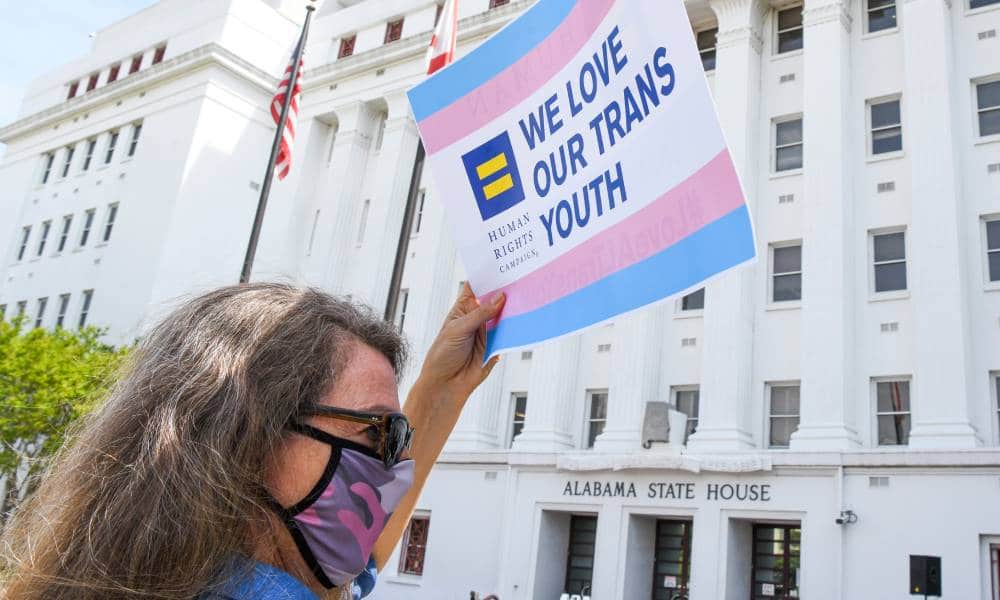A person holds a sign that reads “We Love Our Trans Youth” during a rally at the Alabama State House to draw attention to anti-trans legislation. (Getty/Julie Bennett)
Young trans people who receive gender-affirming healthcare are significantly less likely to become depressed or attempt suicide in the following year, a new study has found.
Gender-affirming care for trans youth, including hormone therapy and puberty blockers, is associated with 60 per cent lower odds of moderate or severe depression and 73 per cent lower odds of suicidality over a period of one year, according to a study published in the journal JAMA Open Network.
While many other studies have confirmed that accessing gender-affirming healthcare has a positive effect on the long-term mental health of trans youth, this study looked into the short-term effects of treatment over a period of 12 months.
“Our study builds on what we have already seen from an already staggering amount of scientific research,” the study’s lead author, Diana Tordoff, told UPI News. “Access to gender-affirming care saves trans youth’s lives.”
Tordoff and other researchers from the University of Washington in Seattle followed 104 participants, who were between the ages of 13 and 20, for 12 months.
Participants were drawn from patients at the Seattle Children’s Gender Clinic. Around two-thirds were trans boys, a quarter trans girls, and 10 per cent non-binary or gender fluid. Nearly two-thirds of the trans youth were white.
At the beginning of the study, nearly 60 per cent of the participants reported struggling with depression, while half experienced anxiety and more than four in 10 said they had recently thought about hurting or killing themselves.
During this time roughly two-thirds of the participants received hormone therapy, puberty blockers or both, while a third received no treatment.
The risk of suicidal thoughts and depression in the teenagers who received no hormone therapy or puberty blockers doubled or tripled at three and six months into the study, researchers found.
However, trans youth who received treatment saw dramatic drops in both depression and suicide risk.
“The results of this new study are in line with several past studies that have linked gender-affirming medical care to improved mental health outcomes for transgender youth,” said Dr Jack Turban, a child and adolescent psychiatrist who was not involved in the study.
“This study once again reaffirms that efforts to ban gender-affirming care for transgender and gender diverse youth are dangerous and will lead to adverse mental health outcomes,” Turban added.
Gender-affirming healthcare has overwhelmingly positive benefit for trans youth, finds study after study
The Seattle study confirms what has been shown by multiple other research efforts: giving trans young people gender-affirming healthcare has an overwhelmingly positive impact on their mental health.
This includes a 2021 study of more than 9,000 trans and non-binary youth by The Trevor Project, an LGBT+ suicide prevention organisation in the US, which found that trans youth who take gender-affirming hormone therapy are nearly 40 per cent less likely to have been depressed or attempted suicide in the last year compared with trans youth who want hormones but don’t receive them.
Another 2021 study, published in journal PLOS One, found the majority of trans teens who take puberty blockers to treat gender dysphoria are happier and report having a positive experience of the treatment.
Also in 2021, a study in Pediatrics found that shorter gender clinic waiting times – getting trans youth access to gender-affirming healthcare sooner – leads to lower levels of depression and anxiety.
There was also a 2020 study in Pediatrics that found access to puberty blockers for trans youth who want them reduces their suicide risk in the short- and long-term, as well as reducing their likelihood of developing mental-health problems.
Gender-affirming healthcare includes hormone therapy, surgeries, speech and language therapy, family therapy, counselling, puberty blockers and body or facial hair removal.
